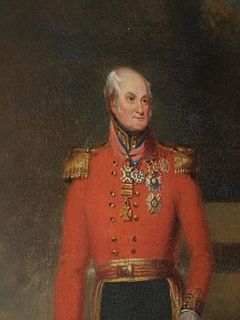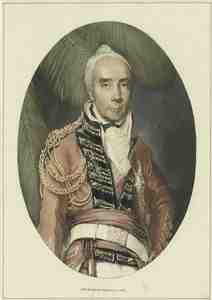 W
WGeneral Sir Robert Arbuthnot, KCB was a British military commander during the Napoleonic Wars. He was a General in the army, a colonel in the 76th Regiment. He was a Brigadier General in the Portuguese Service and was appointed a Knight of the Tower and Sword of Portugal (KTS).
 W
WGeneral Sir George Beckwith KB was a British Army officer.
 W
WLieutenant-General Sir Colin Campbell was a British Army officer and colonial governor.
 W
WMajor-General Sir Neil Campbell CB was a British Army officer who fought during the Napoleonic Wars, administered several British colonies, and escorted Napoleon Bonaparte into exile.
 W
WRichard Ford William Lambart, 7th Earl of Cavan, styled Viscount Kilcoursie from 1772 to 1778, was a British military commander throughout the Napoleonic era and beyond.
 W
WLieutenant-Colonel Andrew Clarke KCH was Governor of Western Australia from 1846 until his death in 1847.
 W
WGeorge Abbas Kooli D'Arcy was a British soldier and colonial administrator. He was governor of the Gambia from 1859 to 1866, and governor of the Falkland Islands from 1870 to 1876.
 W
WGeneral Sir George de Lacy Evans was a British Army general who served in four wars in which the United Kingdom's troops took part in the 19th century. He was later a long-serving Member of Parliament.
 W
WBrigadier General George William St George Grogan, was a career officer in the British Army and a recipient of the Victoria Cross, the highest award for gallantry in the face of the enemy that can be awarded to British and Commonwealth forces.
 W
WMajor-General Charles Stanhope, 4th Earl of Harrington, styled Viscount Petersham until 1829, was an English peer and man of fashion.
 W
WSurgeon General Sir Anthony Dickson Home VC KCB was a Scottish recipient of the Victoria Cross, the highest and most prestigious award for gallantry in the face of the enemy that can be awarded to British and Commonwealth forces.
 W
WLieutenant-Colonel Thomas Huxley was a British Army officer who fought in the Second Carib War, survived the ship wreck of HMS Dromedary; and took part in the British attack on Danish West Indies. When he was part of the 70th Regiment, he married Jessie Scott, the niece of Sir Walter Scott. He later became the Military Secretary to Lord Dalhousie, the Governor General of British North America. He is buried in the Old Burying Ground.
 W
WGeneral Sir James Kempt, was a British Army officer, who served in the Netherlands, Egypt, Italy, the Peninsula, and British North America during the Napoleonic Wars. He led a British brigade at the Battle of Waterloo and later became Governor General of Canada.
 W
WLieutenant-General Sir Henry King KCB (1776–1839) was a British Army officer and Member of Parliament for County Sligo in Ireland.
 W
WMajor Alexander Gordon Laing was a British explorer and the first European to reach Timbuktu, arriving there via the north-to-south route in August 1826. He was killed shortly after he departed Timbuktu, some five weeks later.
 W
WColonel Sir William Owen Lanyon KCMG CB was a British colonial administrator and British Army officer.
 W
WSir Charles Cameron Lees was a British military officer and colonial administrator.
 W
WAmbrose Madden VC was an officer in the British Army. Born in Cork he was an Irish recipient of the Victoria Cross, the highest and most prestigious award for gallantry in the face of the enemy that can be awarded to British and Commonwealth forces.
 W
WLieutenant General The Right Honourable Sir Thomas Maitland was a British soldier and colonial governor. He also served as a Member of Parliament for Haddington from 1790–1796, 1802–06 and 1812–13. He was made a Privy Councillor on 23 November 1803. He was the second surviving son of James Maitland, 7th Earl of Lauderdale, and the younger brother of James Maitland, 8th Earl of Lauderdale. Maitland never married.
 W
WJoseph Wanton Morrison was a British soldier, best known for commanding the British troops at the Battle of Crysler's Farm during the War of 1812.
 W
WLuke Smythe O'Connor was a British army officer and colonial administrator. He served as Governor of the Gambia from 1852 to 1859, and held senior roles in the Colony of Jamaica during the 1860s, including President of the Privy Council of Jamaica.
 W
WMajor General William Havelock Chaplin Ramsden, was a senior British Army officer, who is most notable for commanding the 50th (Northumbrian) Infantry Division during the Second World War.
 W
WField Marshal William Joseph Slim, 1st Viscount Slim,, usually known as Bill Slim, was a British military commander and the 13th Governor-General of Australia.
 W
WGeneral Sir Brent Spencer was an Anglo-Irish officer in the British Army, seeing active service during the American Revolutionary War and the French Revolutionary Wars. During the Peninsular War he became General Wellesley's second-in-command on two occasions. He fought at Vimeiro and testified in Wellesley's favour at the inquiry following the Convention of Cintra. He led a division at Bussaco and two divisions at Fuentes de Onoro. After the latter action, he had an independent command in northern Portugal. Wellesley, now Lord Wellington, was not satisfied that Spencer was up to the responsibilities of second-in-command and he was replaced by Thomas Graham. Miffed, Spencer left Portugal and never returned. He became a full general in 1825.
 W
WMajor Edward Stanley was an English military officer who played one first-class cricket match for Somerset County Cricket Club as an emergency stand-in in 1884. Somerset had arrived in Manchester a player short for their fixture against Lancashire, and had to seek special permission to include Stanley in their team. Stanley lived in Manchester, but had been born in Somerset, and thus qualified for the county. His only first-class appearance was not successful; he did not bowl, and scored no runs in either innings of the match.
 W
WMajor-General Sir Henry Torrens was an Adjutant-General to the Forces.
 W
WMajor General Richard William Howard Howard Vyse was a British soldier and Egyptologist. He was also Member of Parliament (MP) for Beverley and Honiton.
 W
WJohn Whitelocke was a British Army officer.
 W
WColonel Thomas Wildman was a British Army officer during the Napoleonic Wars, a draftsman, and landowner.